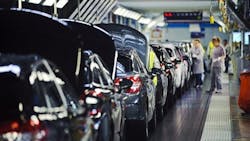French auto group PSA Peugeot Citroen (IW 1000/43) reported on Friday a 13% fall in its 2012 first-half car sales.
The carmaker, which has tied up with General Motors (IW 500/5), is in financial difficulties and is expected to announce restructuring measures.
The French government is expected to announce action next week to help the auto sector.
At Global Equities, broker Xavier de Villepion said: "The future of the group is gloomy."
The alliance with GM, announced at the end of February, had come late in the day, given PSA's poor state, he added, and it led to a withdrawal by German car maker BMW from a joint venture with PSA to build hybrid vehicles.
No Loan Request
A PSA spokesman told AFP that the carmaker had not asked France for a loan, and the French government confirmed that in a statement issued by Economy Minister Pierre Moscovici and Minister of Industrial Renewal Arnaud Montebourg.
But Philippe Bonnin, the mayor of Chartres de Bretagne, home to a PSA site, and coordinator of a recent review of the auto group, said on the website of the financial daily La Tribune that PSA wanted such a loan.
A French union official said on Tuesday that Peugeot might cut up to 10,000 jobs to slash operating costs, more than doubling the figure of 4,000 cuts that the automaker had already unveiled.
At Citigroup, analysts said that PSA's latest sales figures were poor, but had been expected.
Future Financing a Worry
"What worries us most regarding PSA is the state of its cash holdings, and this could affect its credibility with credit rating agencies and make financing more difficult," the Citi analysts said.
The company's capital is controlled by the Peugeot family, while GM now owns 7% percent since the alliance.
PSA, the biggest French automaker ahead of Renault and second-biggest in Europe after the VW group, reported that in the first half of the year it had sold 1.62 million vehicles, either complete or in kits for assembly.
PSA blamed the fall in sales on weak conditions on European markets and the halting of its activities in Iran owing to the effects of international sanctions.
European sales fell by 18% to 980,000 cars and commercial vehicles, and the firm's share of the market fell to 12.9% from 13.9%.
PSA underscored that "the markets which are usually the best [France, Spain and Italy] are in deep crisis."
Many Non-European Markets Fared Well
Sales outside Europe rose, with the exception of a 21% drop in Latin America.
Sales in Russia rose by 17%, in China by 7%, and in the rest of the world by 12%.
PSA achieved 39% of its sales outside Europe, up from 38% in the first half of last year.
The tightening of sanctions against Iran prevented Peugeot from financing parts for its Iranian operation and the group had had to suspend this activity.
PSA Peugeot Citroen has already taken action to cut costs and company president Philippe Varin warned recently that "extra measures will be needed."
The group is expected to say more at two special meetings of its works committee on July 12 and 25.
Trades unions expect that a factory at Aulnay-sous-Bois near Paris will close and that 1,000 jobs would be cut at a factory in Rennes, western France.
On Wednesday, Labour Minister Michel Sapin said that Varin should be clear about the "real situation" of the company, saying that this has been concealed before the recent presidential election in France.
Another Cash-for-Clunkers Subsidy?
Sapin also said he did not think that the measures for the auto sector expected next week would resurrect a cash-for-clunkers subsidy introduced at the height of the recent financial crisis but since ended.
The French car market has turned down since the scheme was phased out.
In Germany, BMW pulled out of a hybrid car project into which it and PSA had invested 100 million euros ($124 million) following the tie-up with GM, which owns the German brand Opel.
German competition authorities said on Wednesday that they were examining the GM-PSA deal, to determine in particular its repercussions for auto parts suppliers.
Copyright Agence France-Presse, 2012
See Also:
About the Author
Agence France-Presse
Copyright Agence France-Presse, 2002-2025. AFP text, photos, graphics and logos shall not be reproduced, published, broadcast, rewritten for broadcast or publication or redistributed directly or indirectly in any medium. AFP shall not be held liable for any delays, inaccuracies, errors or omissions in any AFP content, or for any actions taken in consequence.
